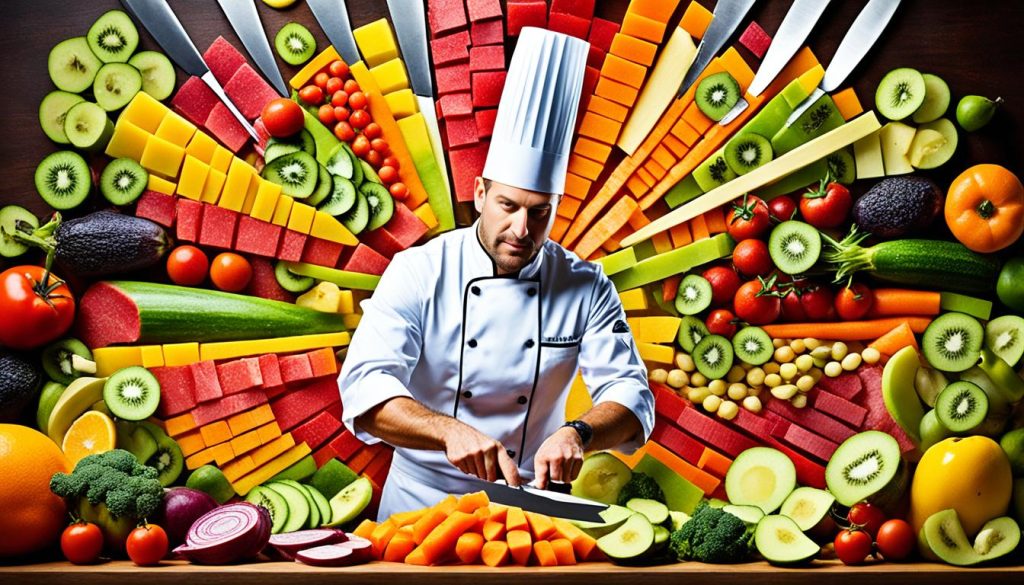Mastering knife skills is key in the culinary world. These skills make food look better and cut more efficiently. When cuts are even, it makes cooking smoother and improves the taste of the dish. Plus, good knife skills make the kitchen safer by cutting down on accidents.
Learning these important techniques can make prep time much shorter. This leads to a smoother workflow, especially in busy kitchens. Understanding the value of knife skills is a big step towards becoming a skilled cook.
Key Takeaways
- Knife skills are fundamental for efficient food preparation.
- Uniform cuts enhance the presentation of dishes.
- Proficient knife handling improves safety in the kitchen.
- Mastering these techniques reduces prep time significantly.
- Knife skills contribute to overall culinary expertise.
The Importance of Knife Skills in Culinary Arts
Mastering knife skills is key in the culinary world. It greatly affects a chef’s cooking experience. These skills make preparing food faster and boost kitchen confidence.
Cooks who know their knives well feel more comfortable in the kitchen. They can easily handle a variety of recipes. This confidence lets them try new things without worry.
Building Confidence in the Kitchen
Having good knife skills lets cooks try out different ingredients and methods. This skill makes them better at making dishes look great and complex. Knowing how important knife skills are can turn a beginner into a skilled cook.
As skills get better, cooks are more likely to take on tough culinary challenges. Using resources like articles on culinary techniques can improve these skills. This makes the kitchen a fun and creative place.
Understanding Different Knife Techniques
Learning various knife techniques is key in the kitchen. Knowing how to cut food properly changes how dishes look, cook, and taste. Each task in the kitchen needs its own cutting method for the best results.
Types of Cuts and Their Uses
Knowing the basics of cutting can improve how you prepare food:
- Slicing: This method makes thin, even pieces, great for salads or meat sandwiches.
- Dicing: It’s all about making uniform pieces, perfect for stews or salsas.
- Julienne: Creates thin, matchstick-shaped veggies, great for stir-fries or garnishes.
- Brunoise: A fine dice used in sauces and soups for a special texture.
- Chiffonade: For herbs and leafy greens, stack, roll, and slice into thin strips.
Each knife technique is vital in the kitchen. It helps cooks work with ingredients precisely and efficiently.
Knife Skills: The Foundation of Food Preparation
Mastering knife skills is key to food preparation. It’s vital for selecting ingredients and making dishes look great. Knowing how to use a knife makes cooking better for chefs and home cooks. It makes food look better and taste more even.
Importance of Knife Skills
Knife skills are essential for a smooth kitchen workflow. Being skilled means you can quickly and accurately chop ingredients. This leads to meals made with precision and a better cooking experience.
Learning basic knife techniques opens up creativity in the kitchen. For instance, making miniature food requires precision and knowledge of ingredients. Check out miniature food art to see how cutting techniques can create beautiful dishes.
Choosing the Right Chef Knives for Your Kitchen
Choosing the right chef knives is key for great cooking. Good kitchen knives make your knife selection better and improve your cooking fun. This choice affects how well you perform and how much you enjoy cooking.
It’s important to look at the different types of knives and what they’re used for in the kitchen.
Types of Knives to Consider
There are many chef knives to choose from:
- Chef’s Knife: Great for slicing, dicing, and mincing.
- Paring Knife: Ideal for peeling and trimming.
- Serrated Knife: Good for slicing through crusty bread and delicate foods.
Other important things to think about when picking knives include:
- Weight: A good weight makes it easier to control.
- Balance: The right balance helps with precise cuts.
- Handle Comfort: A well-shaped handle reduces hand fatigue and improves grip.
Essential Cutting Techniques for Uniform Cuts
Learning key cutting skills is key for making uniform cuts in the kitchen. These skills make food look better and work more efficiently. It’s important to know how to hold the knife, stand right, and use the knife at the right angle for consistent and precise cuts.
Achieving Consistency in Preparation
Uniform cuts can make dishes look professional. When all ingredients are cut the same size, they cook evenly. This brings out flavors and saves time. Here are some tips for consistent results:
- Knife Grip: A firm grip helps control the knife and prevents accidents.
- Body Position: Keep your body balanced for better cutting accuracy.
- Knife Angle: Change the angle for different cuts; a 45-degree angle is best for slicing.
By using these cutting techniques, home cooks can make their food look better. They can also work more smoothly in the kitchen, making cooking more efficient.
How to Master Slicing, Dicing, and Mincing
Learning how to slice, dice, and mince is key to improving your knife skills in the kitchen. Each method has its own way and is used in different cooking situations. Knowing these techniques makes food prep faster and more precise.
Techniques for Each Method
Slicing means making thin, even cuts, great for meats or veggies. Hold the knife handle steady and apply gentle pressure as you cut. This ensures smooth, even slices.
Dicing is about cutting ingredients into small, uniform cubes. It’s ideal for veggies in salads or soups. Start by slicing the food into strips, then cut them into small squares. Aim for uniform sizes for even cooking and a nice look.
Mincing chops ingredients like garlic or herbs into tiny pieces to boost flavors. Use a rocking motion with the knife for a fine mince. Keep the knife tip on the board and chop with the heel for a smooth cut.
With practice, you’ll get better at slicing, dicing, and mincing. This will not only sharpen your skills but also boost your confidence in the kitchen. You’ll be able to try new recipes and be more creative with your cooking.
Maintaining Your Kitchen Knives for Optimal Performance
Keeping your kitchen knives in top shape is key for their long life and sharpness. Regular care boosts their performance and lowers the chance of kitchen accidents. Learning the best ways to sharpen, clean, and store knives can greatly extend their use and effectiveness.
Care and Storage Tips
- Sharpen your knives regularly to keep a sharp edge, which is crucial for food prep.
- Hone your knives often to keep the blade straight, which helps it stay sharp longer.
- Wash knives by hand with mild soap and warm water. Stay away from harsh chemicals that can harm the blade.
- Dry knives immediately after washing to stop moisture from causing rust.
- Store knives safely in a knife block, on a magnetic strip, or in a drawer organizer. This prevents dulling and injuries.
Storing knives right is key to keeping them sharp and safe. It also makes them easy to reach for everyday cooking.
Common Mistakes to Avoid in Knife Skills
Mastering knife skills is key to better cooking. Knowing and avoiding common mistakes can greatly improve your cutting skills. These errors can make food preparation better and boost your kitchen confidence.
Improving Cutting Proficiency
Many chefs, new or experienced, make mistakes that slow them down. Here are some common mistakes to watch out for:
- Using the Wrong Knife: Picking the wrong knife can make cutting hard. Each knife has its own job, so use the right one for the task.
- Improper Cutting Techniques: Bad technique leads to uneven cuts, which can mess up cooking and looks. Work on the basics for better results.
- Neglecting Knife Safety: Safety first. Hold your knife right and use cutting boards to avoid accidents.
- Lack of Knife Maintenance: Dull knives are dangerous. Keep your knives sharp by sharpening them regularly and storing them right.
By spotting and fixing these mistakes, anyone can get better at knife skills. Practice and pay attention to improve your cutting skills and cooking success.
Conclusion
Honing your knife skills is key for culinary excellence. It makes food prep faster and improves your cooking experience. Mastering different knife techniques opens up new possibilities in your cooking, boosting creativity and confidence.
Good knife skills make your kitchen more efficient, leading to even cuts and better presentation. As you get better at these skills, you’ll see how they improve your cooking. They turn simple meal prep into something fun and artistic.
Remember, practicing and using these knife skills often is crucial. This journey will not only make you a better cook but also bring back your passion for every dish. Happy cooking!



